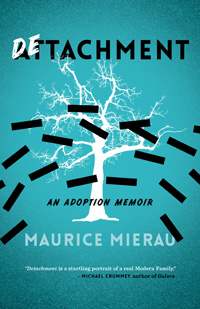Reviews
Nonfiction Review by Bruce Gillespie
Maurice Mierau, Detachment: An Adoption Memoir (Calgary, Freehand, 2014). Paperbound, 226 pp., $21.95.
 It is to be expected that a good memoir will reveal a new and often unflattering facet of a writer; after all, the genre is meant to make public what’s private, and a serious memoirist will examine himself with as much scrutiny as an interviewer would. But it is rare to find a writer who portrays himself as unsympathetically as Maurice Mierau does in Detachment, a stark, unsettling look at the challenges of international adoption and fatherhood. The book recounts Mierau and his wife’s adoption of a pair of young Ukrainian brothers and the early years of their new family’s life together in Winnipeg. At the same time, it follows Mierau’s efforts to piece together the story of his father’s childhood, during which he and his Mennonite family tried to escape persecution in Germany and, later, Ukraine before emigration to Canada. It is this literary project, trying to draw a line from his father’s traumatic childhood to those of his new sons, that causes Mierau problems.
It is to be expected that a good memoir will reveal a new and often unflattering facet of a writer; after all, the genre is meant to make public what’s private, and a serious memoirist will examine himself with as much scrutiny as an interviewer would. But it is rare to find a writer who portrays himself as unsympathetically as Maurice Mierau does in Detachment, a stark, unsettling look at the challenges of international adoption and fatherhood. The book recounts Mierau and his wife’s adoption of a pair of young Ukrainian brothers and the early years of their new family’s life together in Winnipeg. At the same time, it follows Mierau’s efforts to piece together the story of his father’s childhood, during which he and his Mennonite family tried to escape persecution in Germany and, later, Ukraine before emigration to Canada. It is this literary project, trying to draw a line from his father’s traumatic childhood to those of his new sons, that causes Mierau problems.
The book’s title refers to the struggles Mierau’s older son, Peter, faces adjusting to his new family and life. Unable to understand or cope with his feelings of abandonment by his birth mother, he acts out in increasingly violent and dangerous ways—fighting, stealing, and eventually running away from home. But the title also refers to Mierau himself, whose wife calls him out on seeing his sons more as characters for his book than as dependents who need his attention: “In my third-floor office, with the door closed, I tried to explore the connections between my father’s terrible childhood and the adoption of my new sons, often just staring at the blank screen or spending hours reading sports news online. Downstairs Peter and Bohdan played with Betsy and each other, squealing with joy in their new profusion of brotherly togetherness, and protein, and love from a mother who was patient, calm, and not locked away in a room they weren’t allowed to enter.” Mierau is strikingly honest about his struggles to parent the boys. He is reluctant to spend time with them because of their wild behaviour and has little patience for the slow pace of their acculturation to their new life and associated acting out—on one occasion, he calls his wife at work and asks her to hurry home, concerned that he won’t be able to stop himself from hurting Peter.
For all of its grimness, Detachment is an engaging read, thanks to Mierau’s frankness as well as his eye for details, such as when he notes the “fresh-hay-and-milk smell that little boys” have, and his descriptions of travelling through Ukraine: “But every few kilometres there was a village filled with what to us were exotic sights: cathedrals crowned by shining cupolas, crumbling brick buildings, textured concrete fences painted two-tone, in Easter egg colours. The roads wound in narrow cobblestone, rattling our bones and teeth. Stray dogs and ragged people jaywalked carrying Hugo Boss shopping bags.”
In many ways, the book is a refreshing antidote to the Hollywood-style narrative so common in adoption stories in which new families soldier through an initial period of conflict to reach a lasting happy ending. Mierau eschews this sort of sugar-coating in favour of a more realistic approach that documents a slow, often painful, process of adjustment, which seems to move backward as much as it moves forward. In doing so, he highlights the struggles associated with international adoption, both for children and their parents, which makes it an important, if challenging, addition to the canon of adoption literature.
—Bruce Gillespie









